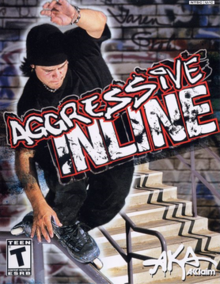Aggressive Inline (video game)
| Aggressive Inline | |
|---|---|
 North American PlayStation 2 cover art | |
| Developer(s) | Z-Axis Full Fat (GBA) |
| Publisher(s) | Acclaim Entertainment[a] |
| Platform(s) | PlayStation 2 GameCube Game Boy Advance Xbox |
| Release | PlayStation 2[1] Xbox[2] GameCube[3] Game Boy Advance[4] |
| Genre(s) | Sports |
| Mode(s) | Single-player, multiplayer |
Aggressive Inline is a 2002 sports video game developed by Z-Axis, published by Acclaim Entertainment under their AKA Acclaim label, and released for the PlayStation 2, Xbox, and GameCube. The game features professional inline skaters, including Chris Edwards, Eito Yasutoko, Franky Morales, Jaren Grob and Taïg Khris.
A different game of the same name was developed by Full Fat and released for the Game Boy Advance.
Gameplay[]
The gameplay focuses on completing goals given by talking to characters within each level. While some goals involve gaining a certain number of points in a specific time, many of the goals involve doing tricks on and off of pieces of the environment (for example: one level asks the player to grind three traffic lights, each one placed at a larger distance and facing a different direction). Another innovative feature focused on a player leveling system where the player would perform better in different areas of skating skill by practicing them repeatedly. For instance, if the player does many air tricks throughout the course of the game, each successful trick would create points in the player's air trick statistics. When the points reach a certain number, the player's air tricks will move up a level, making it easier to perform air tricks faster and more efficiently. The same actions apply to grinding, speed, wall riding, skating backward, etc.
Reception[]
The game received praise for its wide and interactive environments, comfortable control scheme, and innovative gameplay. [5] At the time, it was considered to be a breakthrough competitor to the Tony Hawk series, even being the first to include some elements that would later become standard in the Tony Hawk games, most notably not confining players to rigidly timed play sessions.[6] The game did, however, borrow some elements from the Tony Hawk franchise, notably the seamless combo transitions from Tony Hawk Pro Skater 3, which had introduced the revert mechanic (called a cess slide in Aggressive Inline). [7] The game generally received good reviews for its style of play, with the average review score for the PlayStation 2 and Xbox versions being 85%,[8] and the GameCube version receiving an 88%.[9] The Game Boy Advance version received the worst scores on average,[10] with some critics, such as IGN's Craig Harris, lamenting that Full Flat did not recreate the home console version's structure in handheld form, instead opting for a check list plus top score approach to level completion.[11]
GameSpot named Aggressive Inline the third-best video game of May 2002.[12] It was nominated for GameSpot's annual "Best Alternative Sports Game on GameCube", "Best Alternative Sports Game on Xbox" and "Best Game No One Played on PlayStation 2" awards.[13] However, its Game Boy Advance version won the publication's annual "Best Sound on Game Boy Advance" award.[13]
References[]
- ^ "PlayStation release information".
- ^ "Xbox release information".
- ^ "GameCube release information".
- ^ "Game Boy Advance release information".
- ^ IGN
- ^ https://www.gamespot.com/reviews/tony-hawks-pro-skater-4-review/1900-2895591/
- ^ https://www.gamespot.com/reviews/aggressive-inline/1900-2868354/
- ^ https://www.metacritic.com/game/playstation-2/aggressive-inline
- ^ https://www.metacritic.com/game/gamecube/aggressive-inline
- ^ https://www.metacritic.com/game/game-boy-advance/aggressive-inline
- ^ IGN
- ^ The Editors of GameSpot VG (June 4, 2002). "Video Game of the Month, May 2002". GameSpot. Archived from the original on May 1, 2004.
{{cite web}}:|author=has generic name (help) - ^ a b GameSpot Staff (December 30, 2002). "GameSpot's Best and Worst of 2002". GameSpot. Archived from the original on February 7, 2003.
- ^ Released under the AKA Acclaim label
External links[]
- 2002 video games
- Acclaim Entertainment games
- Aggressive skating
- Game Boy Advance games
- GameCube games
- Multiplayer and single-player video games
- PlayStation 2 games
- Roller skating video games
- Video games developed in the United Kingdom
- Video games developed in the United States
- Xbox games